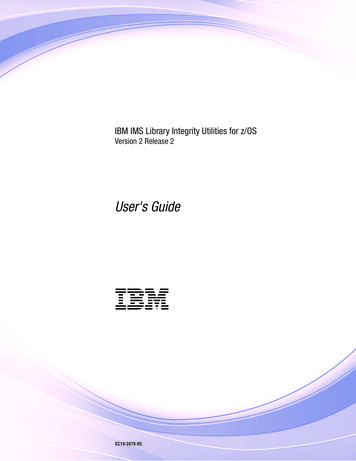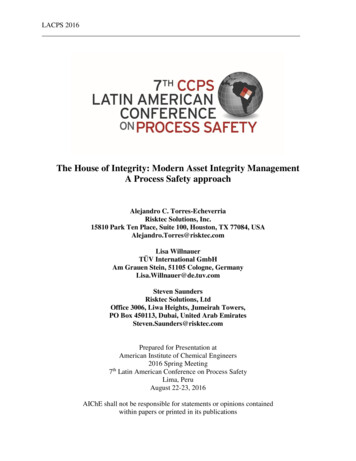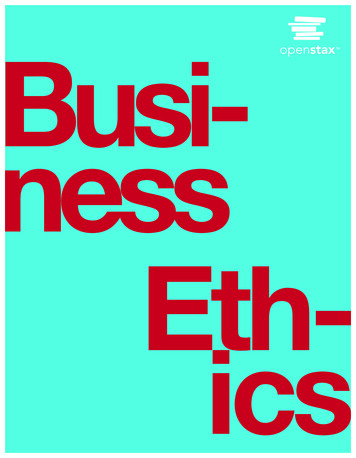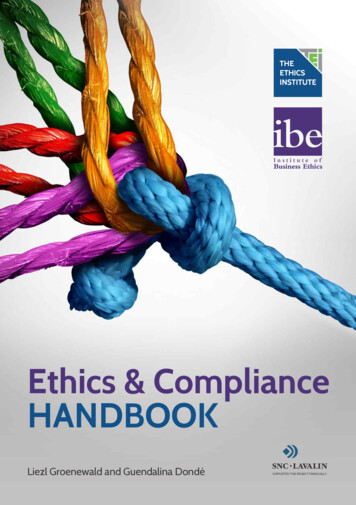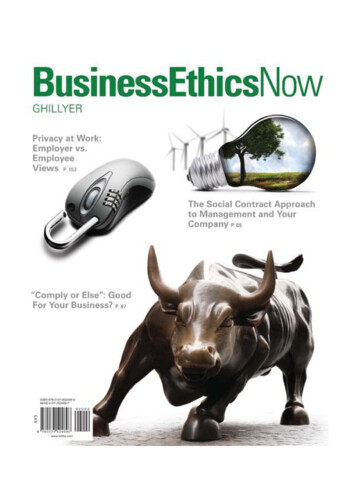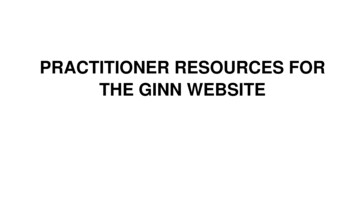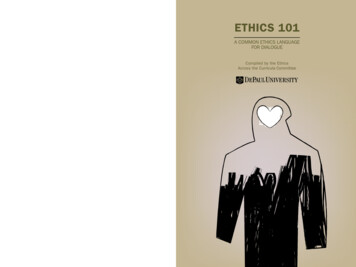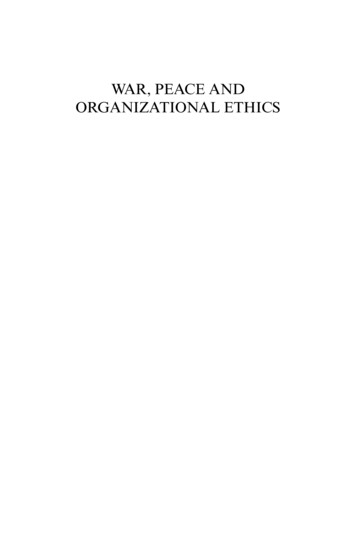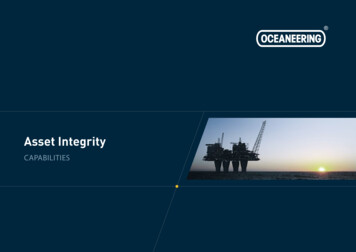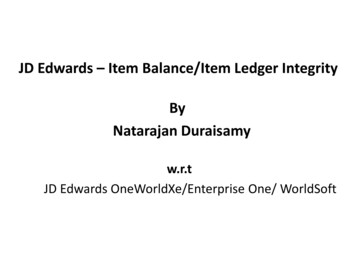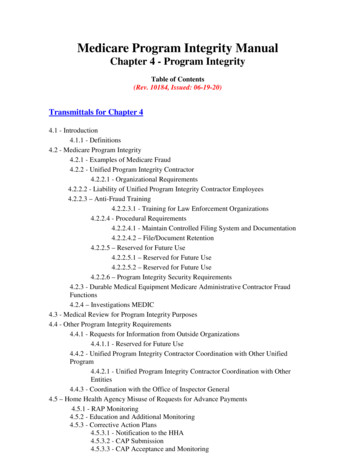
Transcription
Institutional Integrity andOrganizational EthicsCarol Taylor, PhD, RNGeorgetown University School for Nursing and Health Studiestaylorcr@georgetown.edu
n n The crisis in the the US Veterans AffairsDepartment is fundamentally a crisis of ethics,according to the former hospital ethicist at thePhiladelphia Veterans Affairs Medical Center,Evelyne Shuster.The New York Times decried “poormanagement, a history of retaliation towardemployees, cumbersome and outdatedtechnology, and a shortage of doctors andnurses and physical space to treat patients.”The Wall Street Journal lamented a “corrosiveculture” which had damaged patient care.
Million Dollar Questionn But not long ago, VA was at the forefrontof quality care and patient safety. It hadidentified weaknesses in its ethical cultureand had set up a multi-million dollarprogram to deal with it calledIntegrated Ethics. How did things go sowrong?
Workplace Violencen n n n n n n n n almost 75% of all workplace assaults between 2011 and 2013happened in healthcare settings;80% of emergency medical workers will experience violence duringtheir careers;78% of emergency department physicians nationwide report beingthe target of workplace violence in the past year;100% of emergency department nurses report verbal assault and82.1% report physical assault during the last year;40% of psychiatrists report physical assault;the rate of workplace violence among psychiatric aides is 69 timeshigher than the national rate of workplace violence;61% of home healthcare workers report violence annually; andfamily physicians are also at high risk, although limited data exist inthe outpatient setting.N Engl J Med. 2016;374:1661-1669
Medical Errorn Is medical error really the third leadingcause of hospital deaths ?
"The five most dangerous words in businessmay be 'Everybody else is doing it.' "Warren Buffett
ObjectivesUpon completion of this session participants will beable to:n Define ethics, moral agency, and moral integrityn Describe how both individuals and institutions developmoral agency and integrity and the consequences ofhonoring or dishonoring integrityn Analyze how an institution’s mission, vision and corevalues influence institutional decision making, behaviorand integrityn Identify common ethical challenges in the workplace andstrategies for resolving these problemsn Contrast integrity-based and compliance-basedorganizational ethics programs
Objectives(time permitting )Upon completion of this session participants will beable to:n Describe the hallmarks and challenges of qualityinstitutional ethics programsn Distinguish ethics concerns/challenges and relatedresources from legal, safety/quality, human resources,etc. concerns/challengesn Develop strategies for raising ethical awareness withininstitutions and bringing forward ethical challengesn Utilize systematic processes including a values-baseddecision-making model for resolving organizationalethical challenges
STARTING ASSUMPTIONS
Glaser’s three realms of ethicsSocietal RealmOrganizational RealmIndividual Realm
Clarifying ConceptsEthicsn Moral Agencyn Moral Integrityn
What is Ethics?
What is Ethics?n Ethics is the formal study of who weought to be and how we should makedecisions and behave in light of ouridentity
Dan Callahan’s ThreeFoundational QuestionsWhat kind of person ought I be in order tolive a moral life and make good ethicaldecisions?n What are my duties and obligations toother individuals whose life and well-beingmay be affected by my actions?n What do I owe the common good or thepublic interest, in my life as a member ofsociety?n
Distinguishing Clinical andOrganizational Ethicsn Clinical ethics is an interdisciplinary activity toidentify, analyze, and resolve ethical problemsthat arise in the care of particular patients. Themajor thrust of clinical ethics is to work foroutcomes that best serve the interests andwelfare of patients and their families [J. Fletcher, TheBioethics Movement and Hospital Ethics Committees, Maryland LawReview 50 (1991):859n, note 1.].
Organizational Ethicsn The intentional use of values to guide thedecisions of a system.n Objective: strong “FIT” between thesystem’s stated mission and decisionmaking at all levels of the system
Health Care Delivery and ValueCommitments (Nairn article)Promote and defend human dignityn Attend to the whole personn Care for poor and vulnerable personsn Promote the common goodn Act on behalf of justicen Steward resourcesn Act in communion with the Churchn
Values-Based EthicalDecision-MakingStep One: Clarify the Ethical Conflictn Step Two: Identify All of the AffectedStakeholders and Their Valuesn Step Three: Understand the CircumstancesSurrounding the Ethical Conflictn Step Four: Identify the EthicalPerspectives Relevant to the Conflictn
Step Five: Identify Different Options forActionn Step Six: Select Among the Optionsn Step Seven: Share and Implement theDecisionn Step Eight: Review the Decision to EnsureIt Achieved the Desired Goaln [Nelson, W.A. (July/Aug 2005). An organizational ethics decisionmaking process. Healthcare Executive, 9-14.]
n See the Bon Secours Health SystemEthical Discernment Process--handout
Difference between Ethics andComplianceThe compliance strategy, which ispredominantly lawyer driven, meets thebasic needs for legal compliance.n The integrity-based strategy ischaracterized by a conception of ethics asa driving force of an enterprise. Lynn Sharpen Paine
Compliance StrategyIntegrity StrategyEthosConformity with externallyimposed standardsSelf-governance accordingtochosen standardsObjectivePrevent criminal misconductEnable responsible conductLeadershipLawyer-drivenManagement-driven with aidof lawyers, HR, othersMethodsEducation, reduceddiscretion, auditing andcontrols, penaltiesEducation, leadership,mentoring, accountability,organizational systems anddecision processes (“centersof ethical responsibility”)auditing and controls,penaltiesBehavioralAssumptionsAutonomous beings guidedby material self-interestSocial beings guided bymaterial self-interest, values,ideals, peers
What is moral agency?
This requires formation
We know the right thing to dobut it is almost impossible Deficient moral agencyn Ethical Distressn à Ethical Residuen à Disengagementn
What is Moral Integrity?Integrity:1. soundness of and adherenceto moral principle andcharacter; uprightness andhonesty.2. the state of being whole,entire, or undiminished.3. a sound, unimpaired, orperfect condition.From Webster’s EncyclopedicUnabridged Dictionary of theEnglish Language
Snicker Test
Why be a person/ministry ofIntegrity?n “American Baptist Homes of the West willcontinue to hold the trust of itsconstituency by keeping its promises withintegrity, stability, and intentional ethicalbehavior in the provision of qualityservices for older persons”
Effective Ethics ProgramsVeterans Association’s Integrated Ethics Programrespond to ethical questions at the level ofactions and decisions throughEthics Consultation;n address ethics quality gaps at the level ofsystems and processes by applying aquality improvement approach inPreventive Ethics; andn foster a strong ethical environment andculture through Ethical Leadership.n
Ethical Culturen The importance of creating a culturewhere everyone does the right thingsimply because it is the right thing to do
Ethics Case versus Ethics Issue§ Discretesituation at aparticular time§ Aquestion about whatis the best ethicspractice§ Goal to improve ethicsquality by respondingto an ethics question§ Ongoingsituationinvolving organizationalsystems & processes§ A systemic gap betweencurrent and best ethicspractice§ Goal to improve ethicsquality by reducing ethicsquality gaps at a systemslevel
What is Ethics Quality inHealth entVHA, National Center for Ethics in Health Care
Why Ethics Consultants Should Care aboutSystems/Processes & Environment/CultureEthics cases are embedded in, and influencedby, the larger organizational context§ Many ethics cases have systems level causalor contributory antecedents§ Therefore, recurrent cases predict futurecases unless underlying systems issues areidentified and addressed§ VHA, Natioanl Center for Ethics in Health Care34
Why Ethics Consultants Should Care AboutSystems/Processes & Environment/Culture§ Ethics consultants are a limited resource andhave a stewardship interest in preventing therecurrence of similar casesVHA, Natioanl Center for Ethics in Health Care35
Check out this resourcen STRIVING FOREXCELLENCEIN ETHICSa resource for the catholic health ministryhttp://chausa.org/excellenceinethics/
n There are two parts to the resource theydeveloped: a printed booklet and awebsite. The booklet includes anintroduction, recommended standards foreight core components of a robust ethicsservice, and a tool for assessing aparticular organization’s performance withregard to each component as well as eachof its standards
Components of a Robust EthicsServicen n n n n Ethics expertiseEthics committeesConsultation andadvisementEducation andformationPolicy developmentand reviewn n n upportCHA, Striving for Excellence in EthicsAvailable at:http://www.chausa.org/Ethics Overview.aspx
Are Health Care Ethics ProgramFailing to Thrive?n Evaluate present status and decide how the ethics programcan realistically enhance the parent organization– Involve administration, clinical staff, and other affected entities.– Decide where the program should go, what steps are necessaryto get there, and develop a timetable for change, asking for helpwhen needed– Check with other healthcare organizations and see how they arerespondingn Hire a consultant—Evaluation and advice from aknowledgeable and experienced person can be invaluableand, if major changes are likely, necessary. The consultant’swork need not be overly expensive or time consuming.
Are Health Care Ethics ProgramFailing to Thrive?n n n n Reinvigorate ethics committee members witheducational programs and recruit newmembers eager for challenge.Involve administration and Board members inthe planning.Obtain institutional buy-in at all affectedlevels.Monitor the committee’s function at regularintervals to check for signs of incipientmalnutrition (Mills, Rorty & Spencer, HEC Forum, 2006, 285).
Organizational IntegrityFacilitating VariablesLeadership must value institutionalintegrity and communicate this clearly;Senior leadership needs to be “on board”n The institutional mission, vision and valuesmust be known and alive!n Perception that it is “safe” to exploreareas of conflict/concern and that it is OKfor people to disagreen
A methodic process for reasoning aboutethical challenges to refute the notion thatethics is merely a matter of opinionn Perception that this effort “pays off” inbetter outcomes for patients, families andstaff, in short, it is “worth” the time,energy and money investedn The institutional culture must support folksdoing the right thing because it’s the rightthing to don
A critical mass within the institution mustbe recognized for their moral agencyn Institutional ethics resources must beavailable and utilizedn
Constraining VariablesLeadership’s failure to value institutionalintegrityn Ethics is “one more program/initiative”:this year we are doing Baldrigen Failure to distinguish ethical dimensionfrom legal, compliance; to reduce ethics tocompliancen Belief that ethics is a matter of personalopinion; fear of “ethics police”n
ResourcesAmerican College of Health Care Executives Ethics Toolkit: Introduction, Anorganizational ethics decision-making process; Using ACHE’s code of ethics;Using ACHE’s ethical policy statements; Using ACHE’s ethics selfassessment; Strengthening Ethical Decision Making, Additional ethicsresources. Available at:http://www.ache.org/abt ache/ethicstoolkit/ethicsTOC.cfmn Addressing ethics quality gaps on a systems level. The Joint CommissionJournal on Quality and Patient Safety. 38(3), 103-111. Epub 2012/03/23.n Bernhut, S. (March/April 2003). Leader’s edge. Lynn Sharp Paine on themorally and ethically responsible corporation. Ivey Business Journal,Reprint # 9B03TB04n Bishop, L.J. & Cherry, M.N. & Darragh, M. (Reprinted September 1999).Scope Note: Organizational Ethics and Health Care: Expanding Bioethics tothe Institutional Arena. Retrieved May 15 scopenotes/sn36.pdfn
n n n n n Catholic Health Association of the United States and AscensionHealth. (2011). Striving for Excellence in Ethics. A Resource forthe Catholic Health Ministry. http://www.chausa.org/Foglia, M.B., Fox, E., Chanko, B. & Bottrell, M.M. (2012). Preventiveethics: American Society for Bioethics and Humanities Task Force.(2011). Core Competencies for Health Care Ethics Consultation, 2nded. Glenview, IL: ASBH.Fox, E; Myers, S. & Pearlman, R. A. (2007).Ethics consultation in United States hospitals: a national survey .American Journal of Bioethics 7(2): 13-25. Also see the companionarticles in this issue.Justice, access to health care, and organizational ethics. In L.F.Post, J. Blustein, & N.N. Dubler, (2007). Handbook for health careethics committees. Baltimore: The Johns Hopkins University Press,pp. 120-136.Kotter, J. P. (1996). Leading change. Boston: Harvard BusinessSchool Press. N.B. Eight Errors Common to Organizational ChangeEfforts and Their Common Consequences; The Eight-Stage Processof Creating Major Change
Markkula Center for Applied Ethics: What is ethics? Making and ethicaldecision. A framework for ethical decision making. Available at:http://www.scu.edu/ethics/practicing/decision/n McDaniel, C. Developmental and Psychometric Properties of the EthicsEnvironment Questionnaire. Medical Care, 35(9): 901-914n National Center for Ethics in Health Care. Integrated Ethics: PreventiveEthics, Ethical Leadership, Education, Index of IE Resources. Available at:http://www.ethics.va.gov/index.aspn VitalSmarts, AORN, & AACN. Silence Kills and Silent Treatment. Availableat:http://www.ache.org/abt ache/ethicstoolkit/Ethical Decision Process.pdfn
Small group discussionReflection Guiden Advice to Secretary Robert A. McDonald ashe assumed leadership of Department ofVeterans Affairsn Ethical Climate Assignmentn
Georgetown University School for Nursing and Health Studies taylorcr@georgetown.edu Institutional Integrity and Organizational Ethics ! . See the Bon Secours Health System Ethical Discernment Process--handout . Difference between Ethics and Compliance ! The compliance strategy, which is
